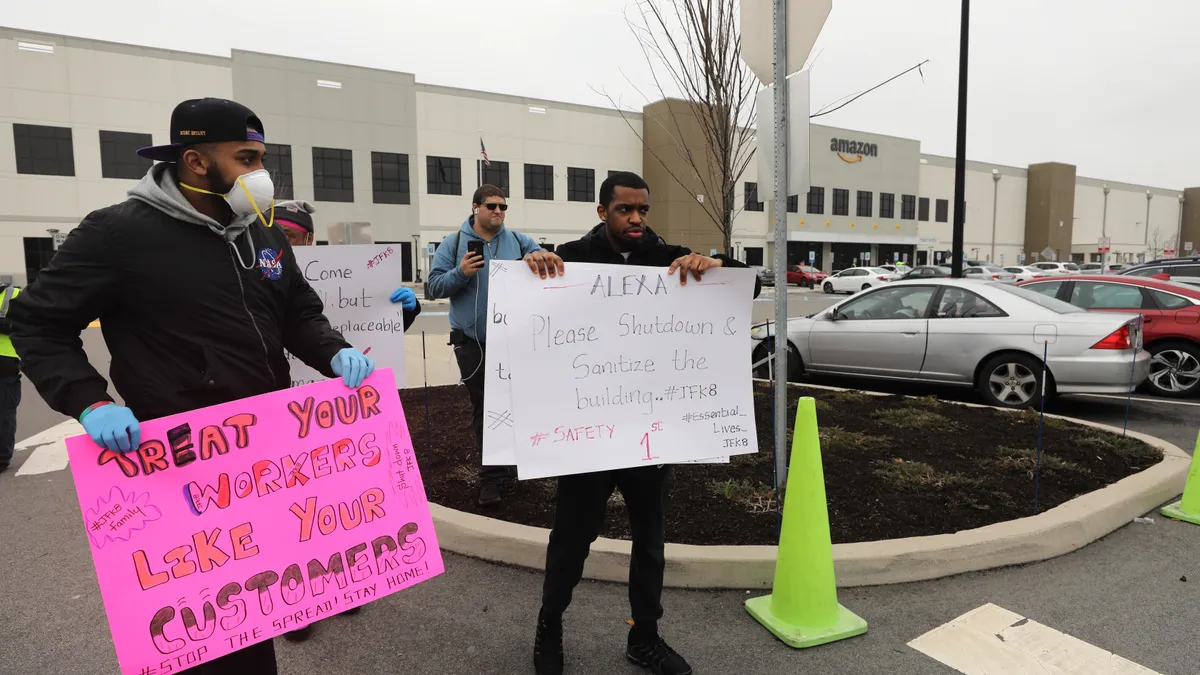Dive Brief:
- Amazon workers at the company's Staten Island JFK8 facility voted Friday to form the e-commerce giant's first union. In a count that finished in the early afternoon, 2,654 workers voted to be represented by the newly formed Amazon Labor Union, while 2,131 workers voted against representation. There were 67 challenged ballots — a number too low to change the outcome.
- The results will not be certified until the regional National Labor Relations Board office processes any objections either party may have, which they must file by mid-April.
- The vote at JFK8 follows a recount at Amazon's Bessemer, Alabama, facility which wrapped up late Thursday afternoon. That facility voted not to join the Retail, Wholesale and Department Store Union, with 993 voting against representation and 875 voting in favor of it. In that case, however, the 416 challenged ballots may be determinative; if the NLRB decides to open and count any of the challenged ballots, the outcome could potentially flip to favor the union.
Dive Insight:
The Amazon union's Staten Island win represents a massive victory for labor organizing in a year that arguably has seen uncommon growth in unionization efforts. It follows a string of union drives and victories at another major corporation, Starbucks — signaling a change in how workers see jobs that tend to provide low wages and lead to high turnover.
A confluence of factors have contributed to the surge in energy around unionization efforts, from safety concerns spurred by the pandemic to a labor market favorable to workers.
Christian Smalls, president of the Amazon Labor Union, helped form the union in April 2021 after he said he was fired from the company's Staten Island facility for "organizing protests over Amazon's unsafe COVID-19 protocols." Workers, many of whom had become sick, asked for the building to be temporarily closed and stringently cleaned, according to the New York Times. (The union also is demanding job security, union pay and "better working conditions.")
Similarly, while Buffalo-area workers began mulling over a union drive at Starbucks in 2019, it took "worsened conditions on the shop floor" caused by the pandemic and favorable labor market trends for the workers to commit to a campaign in early 2021, Restaurant Dive reported.
The pandemic also played a major role in the recent decision by workers at a Manhattan REI store to unionize. Workers said they were concerned about safety protocols, lack of transparency about spread of COVID-19 in the workplace and insufficient pay.
Given Amazon's resistance to unionization at its facilities — the NLRB ordered a new election at Bessemer after the company engaged in "objectionable conduct" — the Staten Island facility's success is notable. It demonstrates that workers appear willing to vote for unionization despite company strategies like captive audience meetings and other methods of discouraging unionization.
"This is a sign of more to come," RWDSU president Stuart Applebaum said at a press conference after the Bessemer recount concluded Thursday. "Workers here have shown what is possible. They have helped ignite a movement."












